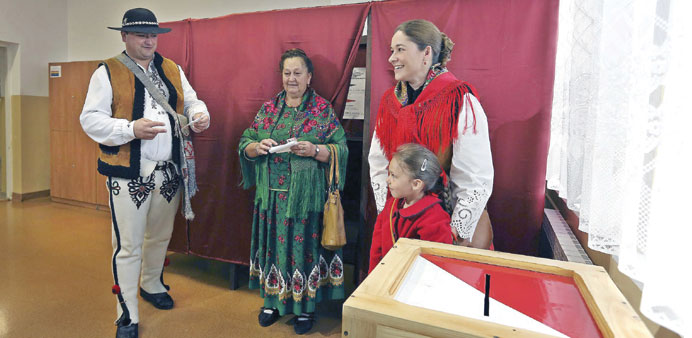AFP
Warsaw
Poles were voting yesterday in a cliffhanger presidential run-off with incumbent centrist Bronislaw Komorowski struggling to fend off a challenge from conservative newcomer Andrzej Duda.
The result is being billed as a pointer for autumn general elections, with analysts saying that disillusioned voters seeking change will play a key role in both ballots.
The Polish president has limited powers but is commander-in-chief of the armed forces, steers foreign policy and has the right to introduce and veto legislation.
Komorowski is allied to the ruling centrist Civic Platform (PO), which has been in power for nearly eight years.
Despite consistent economic growth in the EU and Nato member, high long-term unemployment has limited opportunities for young Poles and drained the government’s popularity.
Komorowski, a 62-year-old communist-era dissident who was jailed by the regime, was stunned by his narrow defeat to Duda in the first round of voting on May 10.
Duda, a populist 43-year-old lawyer and MEP backed by the conservative opposition Law and Justice (PiS) party, led the incumbent by 1% on promises of generous social spending, an earlier retirement age and lower taxes.
But he fell short of the outright majority needed for victory at the first round.
“I voted for Duda because I want change,” public sector worker Wieslawa Lorenc, 46, told AFP in Warsaw after voting in the run-off. “The retirement age just isn’t right. Miners, nurses, teachers, they’re not earning enough and the job market’s bad.”
Komorowski, a former defence minister who has been president since 2010, has the backing of Polish-born former US national security adviser Zbigniew Brzezinski and well as a bevy of actors, athletes and other personalities.
Some ordinary supporters said, however, they simply wanted to avoid an “unpredictable” PiS-themed presidency.
“With a very heavy heart, I voted for Komorowski,” Warsaw voter Alicja, 34, told AFP.
She had backed the anti-establishment candidate, rock star Pawel Kukiz, in the first round to protest the “lack of opportunity for young people on the job market” but Kukiz failed to qualify for the run-off.
Others are so disillusioned with politics that they refused to vote.
“I voted for Komorowski five years ago, but I’m not voting at all this time. There’s no good candidate,” Marek Sadolski, a 46-year-old IT specialist, said yesterday in the southern city of Krakow.
With the rivals running neck-and-neck in opinion polls, analysts insist the election is too close to call.
Analysts also suggest that Komorowski’s struggles are in large measure a signal from voters to the Civic Platform.
In power since 2007, the party has lost support over its failure to boost employment and keep its promises in key areas like administrative and tax reform.
The rival PiS, led by controversial former prime minister Jaroslaw Kaczynski, sees winning over disillusioned voters as key to making a comeback in both the presidency and parliament.
Kaczynski – whose twin brother, the late president Lech Kaczynski, died in a 2010 plane crash in Russia – makes no secret of his wish to return to power.
A Duda win could pave the way for a PiS general election win.
After his defeat to Komorowski in the 2010 presidential election, the 65-year-old Kaczynski floated Duda for president.
Komorowski and Duda were kissing babies and shaking hands nationwide right up to the last hours of the campaign, trying to woo the undecided.
Capturing the support of people who voted for Pawel Kukiz, the firebrand novice, in round one is key.
He finished a surprise third with 20%, backed especially by youth voters.

People in traditional outfits prepare to cast their ballots during the second round of presidential elections at a polling station in Zakopane, Poland
